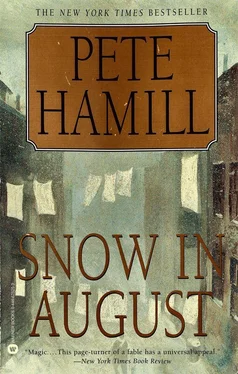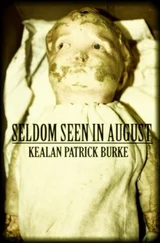“No.”
“How come I don’t believe you, teach? How come I think you could be a perfect fuckin’ canary?”
“The cops came to the house. My mother made them leave. I didn’t say anything to them about anything.”
Suddenly Frankie’s hand came up and a four-inch blade snapped out at the touch of a button.
“You better not, boy. You better not say nothin’ to nobody. Not to that old Hebe up the block. Not to no priest. Not to your mother. Definitely not to the fuckin’ cops. You do? Something bad happens to me? I pay back. That’s what Frankie McCarthy does. Frankie McCarthy pays back. I know where you live. So does every one of the Falcons. I know where your mother works.”
Leave her out of this, prick, Michael thought, but said nothing. Frankie smiled in a mirthless way. Then he closed the knife.
“You remember that, teach,” he said. “You remember what could happen, you teach the wrong shit.”
He flipped his cigarette butt into the alley, then turned and walked slowly to the corner. Michael reached for the wall and steadied himself. His heart was thumping. He watched Frankie McCarthy cross Ellison Avenue and push through the steamed-over glass door of the Star Pool Room.
“You prick,” Michael said out loud, using all those words he’d heard on the streets and almost never used. “You fucking shithead. You cocksucker.”
All the way home, he wished he could summon the Golem.
At their afternoon sessions, Rabbi Hirsch said the words quickly in English and Michael returned them in Yiddish.
“Yes!”
“Yoh!”
“Thank you!”
“A dank!”
“You’re welcome!”
“Nishto… nishto…”
“Nishto far vos.”
“Nishto far vos!”
Rabbi Hirsch smiled. “Good, not too goyish .”
“It has to be goyish ,” Michael said. “I’m a goy.”
“Maybe it’s true, that the Irish are the lost tribe of Israel.” Then deadpan: “What?”
“Vos?”
“This!”
“Dos!”
“Where?”
“Vu?”
“Here.”
“Doh.”
“When?”
“Ven?”
“Now.”
“Itzt.”
“Who?”
“Ver?”
“Now the numbers,” the rabbi said, holding up fingers as Michael said the words.
“Ains, tsvai, drei, fir, finf, zeks, zihen, acht, nein, tsen, elef, tsvelf, dreitsen…”
“Wait, wait, my shoes already I have to take off!”
The rabbi didn’t take off his shoes to count, of course; he made tea. Michael was wearing a yarmulke, a satiny black skullcap that the rabbi had given him, explaining that some head covering must be worn in the house of God. This did not make him a Jew; Rabbi Hirsch made clear that he had no interest in converting Michael to Judaism. Wearing a yarmulke was just a sign of respect for the rules of this particular house of God. Michael told the rabbi that at Sacred Heart only the women were made to cover their heads, while the men held their hats in their hands throughout the services, and the rabbi shrugged. This made Michael wonder again why God had different rules for different people, but he didn’t say this to Rabbi Hirsch.
“Tai?” the rabbi said, gesturing at the teapot.
“Zaiergut,” Michael said. “A dunk.”
While the rabbi prepared tea, Michael went to the bookcase and examined some of the volumes, but he still could not read the alphabets. Rabbi Hirsch had explained some of the basic characters, but they would not stay in Michael’s mind. This was a frustration, because after hearing the tales of the Golem, he had come to feel that the books in their ancient scripts contained secrets he must learn. The alphabets of God, he called them. The alphabets of the world.
He loved opening the volumes and seeing the beautifully designed pages; they were like the huge missals from which the priests at Sacred Heart sang Gregorian chants at high masses. They gave him a similar sense of order and perfection and mystery.
“Later, you can learn to read,” the rabbi said, bringing two glasses of tea to the table. He moved an open letter out of the way. “First, speak. Men first speaked, uh, spoke , and then later they wrote.”
“In the Ten Commandments, did Moses write like this?”
“Nobody know,” the rabbi said.
“Knows,” Michael said. “With an s at the end. Present tense.”
“Nobody knows,” the rabbi said, scooping three sugars into his tea, then handing the spoon to Michael, who did the same. “The original tablets, they have not survive. They might be just, how do you say? A legend. Like the lost tribe…. Some say Moses spoke Egyptian. He definitely didn’t speak Aramaic. That is the language Jesus spoke. We know that for sure. Aramaic…”
So it went until they had finished the tea. Then the rabbi glanced at the letter and said he had to go into the sanctuary to recover a book. Michael followed him. The room was much smaller than the downstairs church at Sacred Heart, but to Michael it had an even more powerful sense of the sacred. A few weeks earlier in this basement sanctuary, Rabbi Hirsch had shown him the Ark, which contained the Torah scroll. That, he explained, was the symbol of the Tradition, a word he often used to describe the kind of Jew he was: a follower of the Tradition. When he said the word, Michael always heard it with a capital letter.
“All the centuries of the Jews?” the rabbi said. “Thousands and thousands of years? To this place, they are connected. That’s what we Jews mean by the Tradition. That is what we have in a synagogue. Everything that ever happened.”
“Is the word synagogue Hebrew or Yiddish?”
“Neither,” the rabbi said, moving slowly through the pews, lifting prayer books, opening them to scan names, closing them. “It’s Greek. This fact even most Jews don’t know. Synagogue is Greek! Amazing! It means, uh, uh, place of assembly in English. I looked up it.”
“Looked it up,” Michael said.
“Yes: looked it up.”
Michael loved these moments. The rabbi was a grown man, but he was always learning something new and becoming as excited as a ten-year-old when he passed the new thing on to Michael. One afternoon, he spoke in an amazed way about the Constitution and the Bill of Rights. Another time he discussed the building of the Brooklyn Bridge in the 1880s and how it changed New York, linking Manhattan to Brooklyn forever. Knowledge made his eyes twinkle, his face seem younger. He paced about the tiny room, he motioned with his hands, waving his fingers gracefully to describe music, making fists to express anger or passion. About some things, of course, Michael was the teacher. American things. Baseball. Movies. Comic books. But most of the time, the rabbi led the class.
On an afternoon like this one, Michael wished he could tell his father about the things he was learning. His mother always listened patiently to his reports, but his father might have been even more excited. If Tommy Devlin had come home, he could have gone to college on the GI Bill, which Michael heard about from the rabbi.
“Imagine,” the rabbi said, “the son of a carpenter, a farmer, a policeman, he can go to the university! Like any rich guy! Is a great country, boychik .”
Michael imagined his father sitting in the kitchen, studying his college books at the same table where Michael was doing his homework. They could talk about how Judaism was the father of Christianity. He could tell his father about the synagogue and its three purposes. It was a house of worship, just like Sacred Heart. It was a house of the people, where Jews could spend time together. And it was a house of study. He wished he could explain all this to his father and let him know how sad Rabbi Hirsch looked when he talked about it.
Читать дальше












